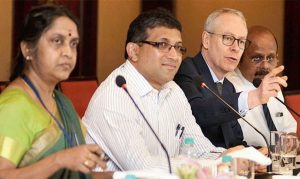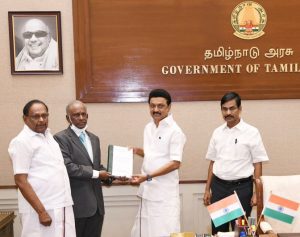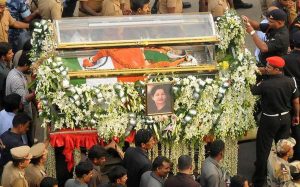Sasikala has been indicted in the Justice Arumughaswamy Commission report but the reasons are different from what some TV channels will have you believe.

VK Sasikala with the body of former Tamil Nadu chief minister J Jayalalithaa in Rajaji Hall on 6 December 2016 (Facebook/VK Sasikala)
When the previous AIADMK government in Tamil Nadu announced the constitution of an Inquiry Commission under retired High Court judge A Arumughaswamy in 2017 to probe the circumstances around the death of former Chief Minister J Jayalalithaa — though it was done for political purposes, especially for the interests of the now-expelled AIADMK leader O Panneerselvam — many welcomed the move thinking that it would finally put an end to all the conspiracy theories surrounding the hospitalisation and demise of the AIADMK supremo.
Throughout the 75-day-long hospitalisation of Jayalalithaa, very little reliable information was shared with the public about her actual health condition.
The secrecy and mystery around the admission of Jayalalithaa to the Apollo Hospitals, and the subsequent political developments after her death made a perfect mix for all sorts of theories to be pushed as to why the former chief minister fell sick and why she died.
It ranged from “Jayalalithaa was slowly poisoned” to she was given “wrong medicines” to “Sasikala pushed her from the stairs” to “someone hit Jayalalithaa on her head with a wooden log” to “her legs were amputated” and so on.
Most of these wild allegations somehow pointed the finger of blame at VK Sasikala, the close aide of the late AIADMK chief, someone known to be her “shadow”.
So, when the Justice Arumughaswamy Commission submitted its final report, after multiple term extensions and delays, on 27 August 2022, some people believed that the controversy around the death of Jayalalithaa could finally be put to rest, despite the questionable manner in which the entire inquiry was conducted.
However, that did not happen.
The report of the commission, which was tabled in the Tamil Nadu Legislative Assembly by the DMK government on 18 October, indicted VK Sasikala and recommended further investigation against her, Dr KS Sivakumar (Sasikala’s relative and the personal physician of Jayalalithaa), former health minister Dr C Vijayabaskar, former health secretary Dr J Radhakrishnan, former chief secretary P Rama Mohana Rao, and Apollo doctors Babu Abraham and YVC Reddy.
Leading national news channels and certain other media organisations jumped at this recommendation and once again held debates asking: “Was Jayalalithaa poisoned?” “Was Jaya given the wrong drugs?” “Jaya’s demise not natural?”
To those media organisations and others who still believe there was foul play in the death of the former chief minister, here’s the fact that’s well established by now: Jayalalithaa died due to natural causes.
This has been placed on record by the doctors who treated her, including international medical experts. It was endorsed by the All India Institute of Medical Sciences (AIIMS) medical board, which was constituted by the Supreme Court to assist the Inquiry Commission with the medical aspects. The same conclusion was also arrived at by the Justice Arumughaswamy Commission itself!
The Inquiry Commission also ruled out the rumours mentioned earlier on the basis of medical evidence and statements from witnesses and doctors.
According to Apollo and the AIIMS medical board, the final medical diagnosis of Jayalalithaa was: “Bacteremia and Septic shock with respiratory infection. There was also infective endocarditis of the mitral valve with mitral regurgitation and first-degree AV block not needing surgery as per Apollo records and surgical and medical opinion. There was also evidence of heart failure. There was uncontrolled diabetes at admission which was treated. There was also a history of hypertension, hypothyroid, asthmatic bronchitis, irritable bowel syndrome and atopic dermatitis.”
But then why did the Justice Arumughaswamy Commission indict Sasikala and others?
While the Commission held that there was nothing “abnormal” or “unnatural” in the conduct of people, including VK Sasikala, at the Poes Garden residence of Jayalalithaa in shifting the latter to the hospital without any delay, and that the former chief minister had passed away due to her serious medical conditions, what the commission also did was put forward its own theory of how the life of Jayalalithaa could have been saved. This thinking was mostly based on assumptions, confirmation bias, misrepresentation, and selective reading of facts.
Speaking specifically about Sasikala, the probe panel indicted her mainly on three grounds.
One, for no compelling reason, the Justice Arumughaswamy Commission dragged in the history of a fallout between Jayalalithaa and Sasikala back in December 2011 where the latter was “unceremoniously” asked to leave from the former’s Poes Garden residence.
The setback in their relationship, according to the Justice Arumughaswamy Commission, was allegedly based on a story that appeared in the magazine Tehelka suggesting that Sasikala and her family members were working against the interests of Jayalalithaa, and was an instance of “over vaulting” ambition.
However, in 2012, the two of them reconciled after Sasikala gave an unconditional apology letter to the former Chief Minister. She came back to Poes Garden and lived with Jayalalithaa until her demise.
But as per the Commission, “though normalcy was restored between the two, still it was not as though perfect bonhomie was restored between the two”. Justice Arumughaswamy also went on to add: “There was simmering discontent in the mind of Sasikala. In this backdrop, the late CM was hospitalised on 22.09.2016.”
This sweeping statement by the Commission was not backed by any evidence. Moreover, one wonders why the two instances — fallout between Jayalalithaa and Sasikala in 2011 and the former falling sick in 2016 — are being read together unless the retired judge wanted to find a way to justify his preconceived narrative that there was some kind of conspiracy in the death of Jayalalithaa.
The second and third reasons why Sasikala was indicted is because the Commission believed that she did not want an angiogram to be performed on Jayalalithaa, and refused to take her abroad for treatment.
While on one hand, the Commission stated that Sasikala was the one who was privy to all the information about the medical treatment given to Jayalalithaa— which the panel also accused her of keeping as a secret — and taking the final call on these matters apart from the doctors who were treating her, there are statements from others in the same report pointing out that senior officials in the government and ministers were given a daily briefing by Apollo on the medical care provided to the former chief minister.
The two options — performing an angiogram on Jayalalithaa as suggested by two doctors and taking her to a foreign country for treatment — according to the Commission, would have saved the life of the former AIADMK chief.

A group of doctors who treated Jayalalithaa interacts with reporters after her death in December 2016 (Supplied)
“The reasonable and irresistible inference to be drawn from the attendant circumstances is that the reversal decision, not to perform the timely angio, must have been engineered by R.1 (Sasikala), who alone had the strategic advantage of influencing the decision,” the report said in addition to blaming doctors Babu Abraham and YVC Reddy for the same.
It may be noted that the retired judge does not have any medical expertise, and this assumption that an angio could have saved Jayalalithaa’s life flies in the face of the consensus arrived at by a team of senior and renowned doctors treating her.
According to them, the former chief minister’s health condition was not good enough at the time for an angiogram to be performed. They decided that it could be done on a later date once her health improved and after other far more serious medical issues were addressed.
The Commission relied heavily on a suggestion given by Dr Samin Sharma, a cardio thoracic surgeon from the US who was brought in by Sasikala’s relatives for a consult, and another doctor that an angiogram must be done. Dr Sharma volunteered to do the procedure himself. However, when this was taken up for discussion with other doctors, including Dr Richard Beale from the UK, it was decided that the angio could be postponed till the time Jayalalithaa’s health got better.
It is important to note here that even the team of doctors from AIIMS who monitored the treatment given to Jayalalithaa agreed with the course of treatment. Moreover, the AIIMS medical board set up by the Supreme Court in its report said that the treatment given to Jayalalithaa at Apollo Hospitals was “as per correct medical practice” and “no errors have been found in the care” provided to the former chief minister.
However, that did not stop the Commission from attributing unfounded motives to the doctors who treated Jayalalithaa.
It said: “The Commission concludes that Dr Babu Abraham played a trick to get over doing angio, to convince some power centre.”
Further, while explaining why an investigation must be ordered against Dr Babu Abraham and Dr YVC Reddy, the probe panel said that the two doctors “successfully threw to the wind” the advice to perform an angiogram “on the pretext of postponing it, to achieve their aim under some pressure.”
Another major grouse of the Arumughaswamy Commission was that Jayalalithaa was not taken abroad for her medical treatment.

Retired Justice Arumughaswamy submits the final report of the commission to Chief Minister MK Stalin on 27 August (Supplied)
Going by the statement of doctors, Sasikala, and others as recorded by the Commission, the main reason why Jayalalithaa was not taken abroad was because she did not consent to it. Overlooking this, the probe panel repeatedly asked why she was not taken to a foreign country for specialised treatment.
The Commission cited the suggestion of UK-based doctor Richard Beale that he was ready to take the former chief minister abroad for her treatment.
But the same Dr Richard Beale and other doctors were quoted as saying that her condition was not stable enough to be taken to another country, and that Jayalalithaa herself did not approve of it. Further, the same doctor, after assessing Jayalalithaa’s health condition at a later stage, said that there was no need to move her to another country as her condition had improved and he was satisfied with the facilities and treatment given to her at Apollo.
Once again, these statements were not considered by the probe panel and the retired judge held Sasikala, doctors at Apollo, the then health secretary and others were responsible for Jayalalithaa not being taken abroad for medical treatment.
The report of the Inquiry Commission also recommended an investigation against the then health minister Dr C Vijayabhaskar and then health secretary Dr J Radhakrishnan.
The former health minister and the then health secretary were privy to a lot of information about Jayalalithaa’s hospitalisation and medical conditions by virtue of their position at the time. They were simply discharging their official duties. However, that itself was held against them.
The retired judge was particularly harsh towards Dr J Radhakrishnan. For instance, the Commission had a problem with the fact that a team of doctors from AIIMS were put up in a star hotel and executive class flight tickets were bought for them to come to Chennai to visit Jayalalithaa. The commission wanted to know why so much money was spent and all these arrangements for doctors who only had a “supervisory” role.

The Justice Arumughaswamy commission report on the hospitalisation and death of former Tamil Nadu chief minister J Jayalalithaa suffers from procedural lapses and makes sweeping inferences
Further, the commission quoted the then health secretary as saying that taking Jayalalithaa abroad for treatment was an insult to Indian doctors, and as a health secretary he could not encourage that. However, according to sources, this statement was made in a completely different context and not with respect to the option of moving the former chief minister to a foreign country.
Apart from such glaring issues, several of the people who have been named in the report also pointed out certain procedural errors in the way in which the whole inquiry was conducted.
Another pertinent question raised by many is why Dr Richard Beale and Dr Samin Sharma, whose medical advice and statements were majorly relied upon by the Commission to arrive at its conclusion, were not examined as part of the probe. In the case of Dr Richard Beale, the commission said though attempts were made to examine him, the senior doctor cited difficulties in appearing before the commission.
“Ultimately, considering the facts and circumstances, and the inequitable and exorbitant cost to be incurred for transportation, accommodation, food etc, this commission thought it fit to peruse the report furnished by him after examining the late CM,” the report said.
As for the Tamil Nadu government, in the Action Taken Report placed along with the final report of the Commission, the government stated that appropriate action on recommendations given by the panel would be taken after obtaining the considered opinion of legal experts.
However, in view of the above-mentioned reasons — of procedural lapses, sweeping inferences, and unfounded conclusions made by the Commission, several experts and political observers have advised the government to junk the report, and rightfully so.

Mar 06, 2024

Feb 24, 2024

Feb 20, 2024

Feb 16, 2024

Jan 23, 2024

Sep 29, 2023